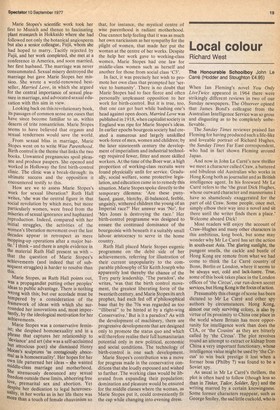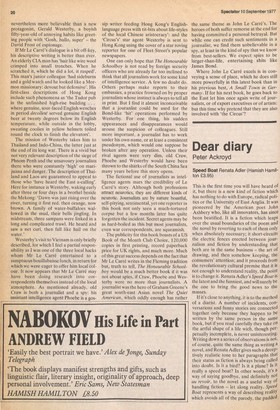Local colour
Richard West
The Honourable Schoolboy John Le Carrel (Hodder and Stoughton £4,95) When Ian Fleming's novel You Only Liverwice appeared in 1964 there were strikingly different reviews in two of our Sunday newspapers. The Observer opined that James Bond's colleague from the Australian Intelligence Service was so gross and disgusting as to be completely unbelievable.
The Sunday Times reviewer praised Ian Fleming for having produced such a life-like and loveable portrait of Richard Hughes, the Sunday Times Far East correspondent, who had in fact shown Fleming around Japan.
And now in John Le Carre's new thriller we meet a character called Craw, a battered and bibulous old Australian who works in Hong Kong both as journalist and as British intelligence agent. In his foreward Mr Le Carr6 refers to the 'the great Dick Hughes, whose outward character and mannerisms I have so shamelessly exaggerated for the part of old Craw. Some people, once met, simply elbow their way into a novel and sit there until the writer finds them a place.' Welcome aboard Dick!
Most readers will enjoy the account of Craw—Hughes and many other characters in this ambitious, long book, but some may wonder why Mr Le Carre has set the action in south-east Asia. The glaring sunlight, the pungent smells, the cackle and bustle of Hong Kong are remote from what we had come to think the Le Carre country of Bonn, Berlin or London, where it seems to be always wet, cold and lack-lustre. True, some of this book takes place in the London offices of 'the Circus', our run-down secret services, but Hong Kong is the focus of action.
Presumably this change of scene has been dictated to Mr Le Carre and other spy authors by circumstances. Hong Kong, almost our only surviving colony, is also by virtue of its proximity to China one place in the world where Britain has more opportunity for intelligence work than does the CIA, or 'the Cousins' as they are bitterly called by 'the Circus'. The plot revolves round an attempt to extract or kidnap from China a very important functionary, whose intelligence value might be used by 'the Circus' to win back prestige it lost when a former boss (Philby ?) was found to be a Soviet spy.
As usual in Mr Le Carre's thrillers, the plot is often hard to follow (though less so than in Tinker, Tailor, Soldier, Spy) and the writing marred by a certain knowingness. Some former characters reappear, such as George Smiley, the sad little cuckold, who is nevertheless more believable than a new protagonist, Gerald Westerby, a boyish fifty-year-old of annoying habits like greeting people with 'Gosh, hullo, super' — the David Frost of espionage.
If Mr Lc Carre's dialogue is a bit off-key, his descriptive writing is better than ever. An elderly CIA man has 'hair like wire wool crimped into small trenches. When he scratched it, which he did a lot, it rasped'. This man's junior colleague 'had sideburns and a gold watch and he looked like a Mormon missionary: devout but defensive'. His first-class descriptions of Hong Kong include such phenomena as 'the Tudor pub in the unfinished high-rise building . where genuine, sour-faced English wenches in period decollete served genuine English beer at twenty degrees below its English temperature, while outside in the lobby, sweating coolies in yellow helmets toiled round the clock to finish the elevators'.
The mission of Westerby takes him to Thailand and Indo-China, the latter just at the end of its long war. There is a vivid but not very relevant description of the siege of Phnom Penh and the unsavoury journalists there who were constantly 'high' on marijuana and danger. The description of Thailand and Laos are guaranteed to appeal to those who 'have heard the East a-calling'. Here for instance is Westerby, waking early after three or four days in a brothel beside the Mekong: 'Dawn was just rising over the river, turning it first red, then orange, now brown. A family of water-buffaloes wallowed in the mud, their bells jingling. In midstream, three sampans were linked in a long and complicated trawl. He heard and saw a net curl, then fall like hail on the water.'
Westerby's visit to Vietnam is only briefly described, for which I feel a partial responsibility as I was one of the three local hacks whom Mr Le Carre entertained to a sumptuous bouillabaisse lunch, in return for which we were eager to offer him local colour. It now appears that Mr Le Carre may have been doing research into correspondents themselves instead of the local atmosphere. As mentioned already, old Craw is both a journalist and a spy: his assistant intelligence agent Phoebe is a gos sip writer feeding Hong Kong's Englishlanguage press with tit-bits about life-styles of the local Chinese aristocracy': and the 'Circus's' star agent Westerby is sent to Hong Kong using the cover of a star roving reporter for one of Fleet Street's popular newspapers.
One can only hope that The Honourable Schoolboy is not read by foreign security officers who are already far too inclined to think that all journalists work for some kind of intelligence service. A few no doubt do. Others perhaps make reports to their embassies, a practice frowned on by proper journalists whose instinct is always to tell all in print. But I find it almost inconceivable that a jouranlist could be used for the Bond-like 'hit' operations performed by Westerby. For one thing, his sudden appearances and disappearances would arouse the suspicion of colleagues. Still more important, a journalist has to work under his own name, or at least a consistent pseudonym, which would one suppose be broken after any operation. Unless their rival agents were very dim, old Craw, Phoebe and Westerby would have been thrown to the sharks of the South China Sea many years before this story opens.
The fictional use of journalists as intelligence agents mars the credibility of Le Carre's story. Although both professions attract neurotics, they are different kinds of neurotic. Journalists are by nature boastful, self-pitying, sentimental, yet one reporter in this book not only seen a much-tortured corpse but a few months later has quite forgotten the incident. Secret agents may be as hard-boiled as this but most journalists, even war correspondents, are squeamish.
The publicity for this book boasts of a US Book of the Month Club Choice, 120,000 copies in first printing, record paperback price for UK rights, and much more. Much of this great success depends on the fact that Mr Le Cane writes in the Fleming tradition but, truth to tell, The Honourable Schoolboy would be a much better book if it was not about spies, if Craw, Phoebe and Westerby were no more than journalists. A journalist was the hero of Graham Greene's great south-east Asian novel The Quiet American, which oddly enough has rather the same theme as John Le Carre's. The heroes of both suffer remorse at the end for having committed a personal betrayal. But while one can credit such sentiments in a journalist, we find them unbelievable in a spy, at least in the kind of spy that we know from best-sellers. We expect spies to be larger-than-life, entertaining shits like James Bond.
Where John Le Carre excels is in conveying a sense of place, which he does still more powerfully in this latest book than in his previous best, A Small Town in Germany. If for his next book, he goes back to the East let him once again write of journalists, or of export executives or of artists: but this time why pretend that they are also involved with 'the Circus'?































 Previous page
Previous page